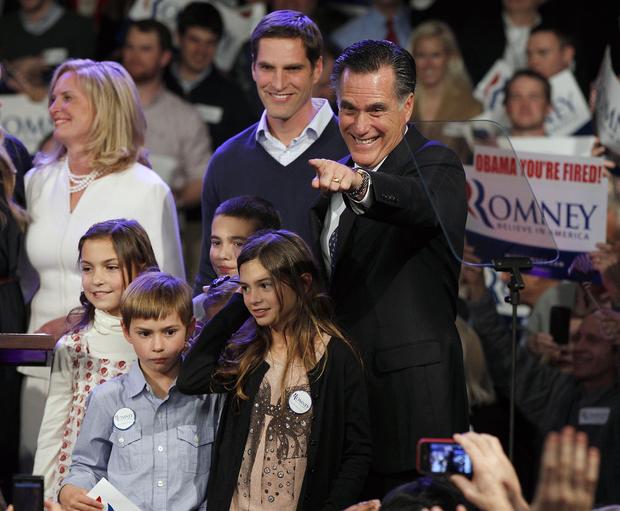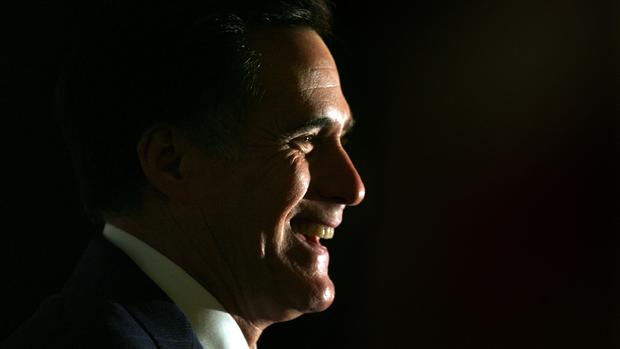Why Mitt Romney won the New Hampshire primary
Mitt Romney won a decisive victory Tuesday night in New Hampshire. The CBS News exit poll showed he expanded his base of support well beyond the groups he won in Iowa. His appeal was grounded in beliefs that he has the best chance of defeating President Obama in November and is the most equipped to handle the struggling economy. The other candidates each found trouble gaining traction against Romney on his home turf.
Full New Hampshire primary results
New Hampshire Exit Poll
Republican Primary Election Center
Favorite Son
The lure of having someone with local roots on the ballot in November was clearly attractive to New Hampshire GOP primary voters. Romney - the former Massachusetts governor who owns a summer home in New Hampshire - was the only candidate that a majority of voters claimed they would be content with as the Republican nominee. Sixty-one percent of New Hampshire primary voters would be satisfied with Romney winning the nomination, compared to only 43 percent who would satisfied if Ron Paul won, 37 percent who would satisfied if Rick Santorum won, and 35 percent who be satisfied if Newt Gingrich won.
Widespread Appeal
Romney defeated his competitors across a wide range of demographic groups in New Hampshire, including many of which he lost in the Iowa caucuses. He won female voters by 20 percentage points and male voters by 12 percentage points. He won among voters from urban areas by 13 percentage points, from suburban areas by 19 percentage points, and from rural areas - a group he lost in Iowa - by 10 percentage points. He won every age group with the exception of those under the age of 30, who again sided again with Paul by a comfortable margin.
Romney also did well among voters across the political spectrum. He easily won the support of self-identified Republicans, crushing Paul by 33 percentage points. And he came close to winning self-identified independent voters - a group he lost by 24 points in Iowa - losing to Paul 32 percent to 29 percent.
Romney won pluralities of support from both economic and social conservatives. Among voters who reported being conservative on fiscal issues such as taxing and spending, Romney bested Paul 37 percent to 21 percent. More impressively, he won a plurality of support among voters who reported being conservative on social issues such as gay marriage and abortion, securing 35 percent of their vote compared to 20 percent for Santorum.
Full CBS News coverage: Mitt Romney
Perceived as the Most Electable
New Hampshire Republican primary voters were primarily concerned about winning the presidential election than the conservative credentials of the candidates. Thirty-five percent of voters reported that the ability to defeat President Obama was the most important candidate quality in their decision. Among these voters, Romney was their overwhelming choice, receiving a whopping 62 percent of their support compared to 12 percent for Gingrich and 11 percent for Paul.
Similarly, when New Hampshire GOP primary voters were asked which candidate had the best chance of beating Mr. Obama this November regardless of who they voted for, they named Romney by an enormous margin. Fifty-six percent of voters indicated that he had the best shot of defeating the president, compared to just 15 percent who named Paul and 11 percent who named Jon Huntsman.
The economy was the most important issue to New Hampshire GOP primary voters by a wide margin. Sixty-one percent of voters indicated that the economy mattered most in deciding their vote on Tuesday. The federal budget deficit was a distant second, accounting for 24 percent of voters' decisions. Abortion and health care were named respectively by only 6 and 5 percent of voters.
Of those primary voters indicating that the economy was their most important issue, they chose Romney by a wide margin. Nearly half - 45 percent - of voters selecting their candidate based on the economy preferred Romney, compared to 21 percent who preferred Paul and 18 percent who preferred Huntsman.
Similarly, Romney was the choice among primary voters concerned about the future performance of the economy. More than two-thirds - 69 percent - of voters were very worried about the direction of the nation's economy in next few years. Among these voters, Romney topped Paul 40 percent to 24 percent.
Paul Unable to Expand Base
Paul once again attracted widespread support from young people and political independents, but showed no signs of being able to expand on this base. Amongst New Hampshire GOP primary voters 18 to 29 years of age, he defeated Romney 47 percent to 25 percent, but could not secure more than 20 percent of voters over 45 years of age. He won 32 percent of the vote from self-identified independents, but could not top 16 percent support among self-identified Republicans.
Few Evangelical Voters in the Electorate
Santorum, who nearly won the Iowa caucuses last week, finished a distant fourth in the Granite State because the core of his Iowa support - evangelical voters - comprised a much smaller proportion of the New Hampshire electorate and did not support him at nearly the same level. Evangelicals made up only 22 percent of New Hampshire voters compared to 57 percent of Iowa caucus goers. Moreover, Santorum decisively won evangelicals in Iowa 32 percent to 14 percent, while he was soundly defeated among them in New Hampshire, losing the evangelical vote to Romney 30 to 23 percent.
Why evangelicals coalesced around Rick Santorum
Santorum received little bounce from his unexpected performance in Iowa. Nearly half of New Hampshire GOP primary voters - 46 percent - decided who to vote for in the last few days of the campaign. However, only 15 percent of late deciders opted for Santorum placing him fourth behind Romney who received 32 percent, Huntsman who received 22 percent and Paul who received 19 percent.
Even Fewer Crossover Democrats
Huntsman, who bypassed Iowa and headed to New Hampshire, drew most of his support from crossover Democrats and liberals. The New Hampshire GOP primary rules enable anyone to vote regardless of their ideological leaning as long as they are not registered as a Democrat. On Tuesday, a number of left-leaning voters showed up at the polls and threw their support behind Huntsman.
One out of every 25 voters who cast a ballot in the Republican primary identified themselves as a Democrat. Huntsman received a whopping 41 percent of their support, easily defeating Paul and Romney who secured respectively 24 percent and 14 percent of their voters. Similarly, Huntsman received 25 percent support of moderate to liberal primary voters.
Poll results discussed in this article are based on a National Election Pool entrance poll conducted by Edison Media Research. Interviews were conducted with 2760 primary voters as they exited precincts around New Hampshire. The margin of error for the poll is +/-4 percentage points.

